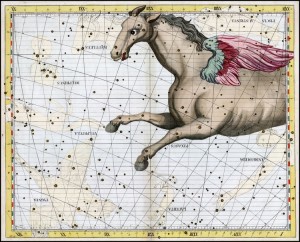How are exoplanets named?
51 Pegasi b is the famous object Michel Mayor and Didier Queloz discovered in 1995 – an exoplanet around a star in the constellation Pegasus. The star was labelled 51 Pegasi by English astronomer John Flamsteed in 1712 in his star atlas. The lowercase letter “b” indicates that it was the first exoplanet discovered orbiting its host star. Other star catalogues used for naming exoplanets are for instance Wilhelm Gliese’s index (GJ) or HD named in honour of Henry Draper whose widow donated the money to finance it. Exoplanets can also be named after astronomical projects like the ground-based Hungarian Automated Telescope Network (HAT) or their discovering space observatory. Kepler-34(AB)b is an exoplanet that was found by NASA’s Kepler space telescope. It orbits the object Kepler-34 consisting of two Stars A and B. The exoplanet’s name shows that it circles around both of the stars in the binary system. Soon there will be nicer names for some selected exoplanets. The International Astronomical Union started a contest to give popular names to exoplanets along with their host stars.
http://www.iau.org/public/themes/naming_exoplanets/
← Faqs



Comments are closed.